#taxi dispatch system
Explore tagged Tumblr posts
Text
2. How Taxiappz Can Boost Your Taxi Dispatch Efficiency
Managing a taxi service can be challenging, especially when it comes to dispatching rides quickly and efficiently. That’s where Taxiappz comes in—a smart solution designed to make your operations smoother and your customers happier.
Here’s how Taxiappz can help you improve your taxi dispatch solution:
1. Quick Ride Assignments
Taxiappz's Advanced Technology will make passenger- driver connection instantly (using the latest technology for its passengers to connect with nearby drivers). It reduces the customer's waiting time while keeping the drivers busy, bringing in all the efficiency in no time.
2. Automation Saves Time
No more manual errors and delays. Taxiappz makes it all automated, taking care of the dispatch process and ensuring quick booking assignments along with precise management.
3. Real-Time Fleet Tracking
Monitor your fleet and drivers all at once. Get Taxiappz for a clear understanding of the real-time status of your fleet. This enables you to make effective decisions and control your operations.
4. Better Customer Experience
Taxiappz guarantees passengers are always informed and happy through live ride-tracking, expected arrival time, and updates so they're more likely to use your service again.
5. Driver-Friendly Tools
Taxiappz assists drivers with user-friendly tools to accept rides, navigate routes, and handle schedules. All of these factors contribute to smoother driver experiences and higher customer satisfaction.
6. Fits Any Business Size
Taxiappz is designed to scale with your operation, whether you operate a small fleet or a large one. This provides usefulness with any application such as ride-hailing, corporate transportation, etc.
7. Data to Improve Performance
Taxiappz will give you strong business intelligence based on trip data, driver performance, and customer feedback. You can use this data to spot what's working and fix what's not.
8. Easy Integration
Using Taxiappz will grant you additional seamlessness and efficiency by working with other tools such as payment systems and GPS tracking.
9. Customizable for Your Business
Every taxi service is different, and Taxiappz can be customized to fit your specific needs. From branding to unique features, the platform adapts to you.
10. Lower Costs, Higher Profits
Taxiappz helps you save on costs by optimizing routes, reducing fuel usage, and cutting down on manual tasks. This means better profits for your business.
Conclusion
Taxiappz is the ultimate tool for improving your taxi dispatch system. With faster ride assignments, happier customers, and smarter management, it’s a game-changer for your business.
Ready to take your taxi service to the next level? Contact us today and discover how Taxiappz can make a difference!
2 notes
·
View notes
Text
Best Taxi Dispatch Software in 2025: Complete Guide
This guide will help you choose the best taxi dispatch software for 2025, as well as its main features, benefits, costs, and how a taxi cab dispatch software development company can help you create a unique solution. There has been a lot of change in the taxi industry, and effective fleet management now requires taxi cab dispatch software. The correct taxi dispatch software can improve customers’…
0 notes
Text
The Essential Features of Taxi Booking Software for Modern Fleet Management
Introduction: Discuss the importance of taxi booking software in modern fleet management.
Key Features:
Real-time booking and tracking.
Integration with payment gateways.
User-friendly interface for drivers and customers.
Support for multiple payment options.
In-app ride history and receipts.
Benefits:
Increased efficiency.
Improved customer experience.
Streamlined operations.
Conclusion: Emphasize the competitive edge taxi companies gain with the right software.
0 notes
Text
Fleetera: Taxi Software - Why Choose Mobility as a Service?
Why opt for Mobility as a Service with Fleetera Taxi Software? Explore the benefits of seamless transportation solutions. Ready to elevate your business? Take the next step now! https://www.fleetera.io/blog/why-mobility-as-a-service-a-great-choice/
0 notes
Text

Fleet Management System
Logistifie's fleet management system empowers businesses to effectively manage their vehicle fleets. With features such as real-time tracking, route optimization, and performance analysis, our system maximizes operational efficiency and reduces costs. Explore our comprehensive fleet management system and unlock the potential of your fleet: Fleet Management System.
#dispatch system#online taxi dispatch system#cab dispatch system#driverapp#transportation#logistifie#infographic
4 notes
·
View notes
Text
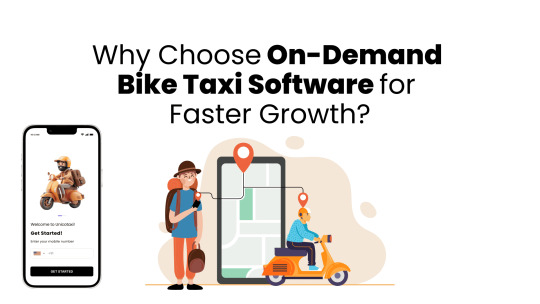
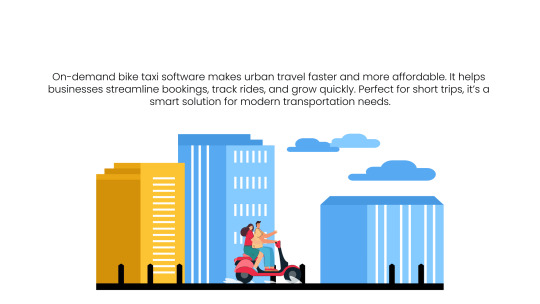
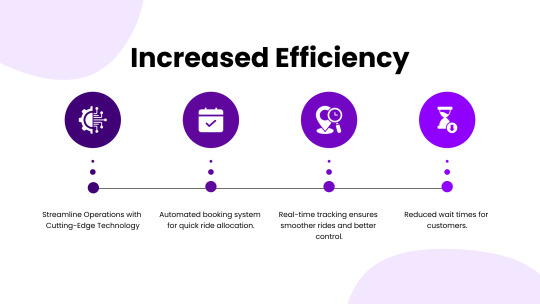
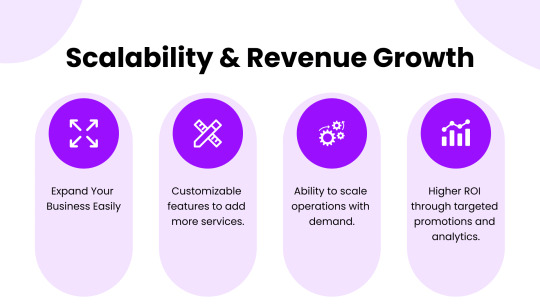
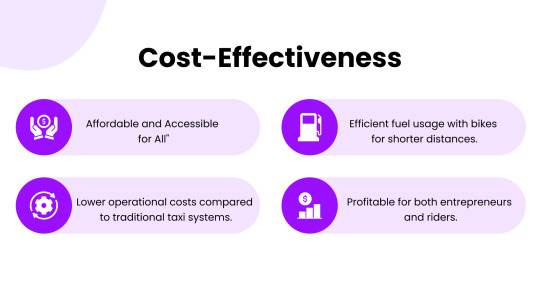
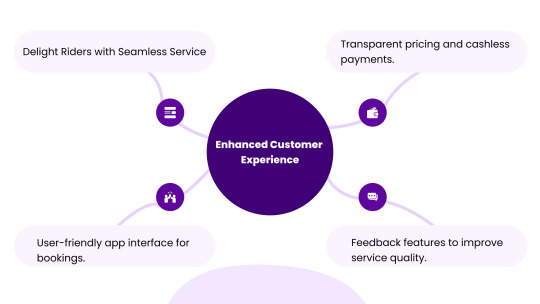

Why choose on-demand bike taxi software for your business? Our infographic breaks down the benefits you can’t afford to miss!
Pin it for later and start your journey toward faster growth with UnicoTaxi!
📌 https://www.unicotaxi.com/solutions/bike-taxi-app-development
#UnicoTaxi #BikeTaxi #Infographic #BusinessGrowth #Transportation #biketaxiapp #biketaxisoftware #ondemandbiketaxiapp #repidoclone #dispatchsoftware #dispatchsystem #ondemadtaxiapp #onlinebiketaxi
#unicotaxi#bike taxi#bike taxi software#bike taxi app#ondemand bike taxi app#dispatch system#dispatch software
1 note
·
View note
Text
I’m curling up to start my reread of The Vampire Armand, which feels like the perfect way to cap off Valentine’s Day. I think I was thirteen the first time I met my blorbo. I usually go with thirteen although for some reason the year 2007 stands out in my mind, which would have meant I just turned twelve. Perhaps, like Lestat says, memory plays its tricks. The month was February, that I remember for sure. We lived in a rundown old apartment in New York City that I don’t think had been renovated since the second World War. It was snowing outside and freezing inside. Somewhere in another room a toddler cried. I still had a child’s bed, although I hadn’t felt like a child in a very long time. A white quilt with beautiful large pink roses and lush green leaves stitched in. It was one of the few beautiful things I had to myself; it got stolen from the laundromat across the street a few months later. I never expected to make it out of that apartment, although I did, ironically, end up leaving younger than most and made my grand exit at sixteen. But these are the conditions in which I met Armand, and to quote Marius, “I loved him instantly and impossibly.”
Maybe it was just that easy for one wounded child, a common child, to love another. I don’t think I had enough self-awareness to project on Armand at that age, and I don’t necessarily think I project on him now either. If, gun to my head, I had to pick any VC character, I would say my personality most closely aligns with Lestat’s. The tears, the inappropriate laughter that stems from a dysregulated nervous system that pisses everyone off, the temperament (which unfortunately, is my father’s as well), the hurts, the mother wound, etc. That’s if I have to pick though, and that’s obviously not my full story. I wasn’t blessed with his kind of charisma and showmanship, and I definitely don’t have his optimism and buoyancy either. But I can absolutely understand what Anne meant when she said Lestat was her “ideal self”. We all want that ability to spring back, don’t we?
I loved Armand as I had never loved another character with TVA alone already, but seeing him through Lestat’s eyes in TVL is what I think cemented that love forever. When Lestat said: “This was the coven master, surely, this quiet and forceful one, the one who would survive, no matter how the orphan in him wept.” I just thought… well shit, that has to be me, doesn’t it? I have to be that one, the one who would survive. Even if I didn’t want to. And guess what? I did survive and I am surviving, almost a full twenty years later. Sometimes I get really sick, or I get really hurt, both of which are sadly the undeniable proof and nature of living. But I’m here, I’m trying—like Armand—I’m always trying to change and grow as best I can. And I’m getting to the point where it’s either a product of time, or trauma, or repeated illness, or all of the above, but I just don’t remember things the way I once did—and I used to have a photographic memory that I was so proud of, as if I had done anything to earn it in the first place.
My childhood and adolescence blend together into one indiscernible grey soup, punctuated by a few moves, a couple babies born, a baby lost before it was known, a dead cicada on the pavement, and a wild-haired boy on the school playground who has since passed away. Sticky ice cream, a pretty girl who pretended to be my friend in the third grade so she could copy my worksheets, and a wanted for homicide poster at the taxi dispatch center. Most of the time it doesn’t feel like I’m even remembering my own life, the reference points are so few and far in between. Maybe, like Armand tells Benji, I was born from a black egg. No, that can’t be, I have too much of my father and my mother in me, the good and the bad and the little extra surprises just for me.
But books are still something that stands out to me, something tangible that preserves the moment and the environment in which I first knew them. Evidence that all those things happened, that I was there, that I left. That I loved those babies and I loved that boy. That it wasn’t all bad, not really. I’m not who I thought I was going to be when I grew up, but for a long time, I didn’t think I would grow up at all.
I’m still here though, and the words: “I looked off, wanting the quiet, dreaming of bowers suddenly, not in words but in images, the way my old mind would do it, wanting to lie down in garden beds among growing flowers, wanting to press my face to earth and sing softly to myself. The spring outside, the warmth, the hovering mist that would be rain. All this I wanted. I wanted the swampy forests beyond, but I wanted Sybelle and Benji, too, and to be gone, and to have some will to carry on”, still fill me with the same thrill and melancholy comfort they did when I read them for the very first time all those years ago… And it finally felt like someone understood. ♥️
#i rarely get this sentimental on here but this is one of my many love letters to armand i suppose#and to anyone who resonates with it in whatever way <3#i didn’t really plan to write this but i open tva and immediately got hit with feelings and now it’s midnight#maybe i’ll feel too vulnerable in the morning and delete maybe i won’t#oh well#hekate.txt
33 notes
·
View notes
Text
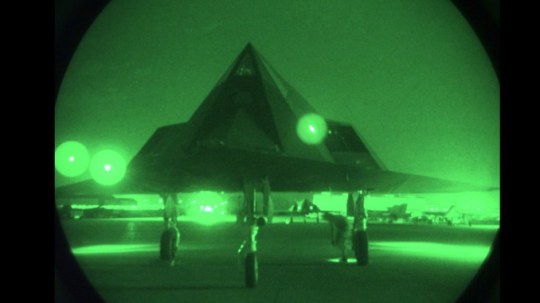
25 Years Ago Today: An U.S. F-117 Stealth Jet Is Shot Down Over Serbia 🇷🇸
March 27, 2024 Military Aviation
F-117 shot down
F-117 as seen through the NVGs (A1C Greg L. Davis, USAF, via National Archives)
OTD in 1999, “Vega 31” was shot down near Belgrade. Here’s how it went.
On Mar. 27, 1999, during the fourth night of Operation Allied Force (OAF) over Serbia, a U.S. Air Force F-117 Nighthawk (#82-0806), flown by Lt. Col. Darrell P. Zelko, was shot down while returning to Aviano airbase, after a strike mission against a target near Belgrade.
The F-117, callsign “Vega 31”, was hit by one of a series of missiles fired by a S-125 “Neva” missile system (NATO reporting name, SA-3 “Goa”) belonging to the 3rd Battalion of the 250th Air Defence Missile Brigade of the Army of Yugoslavia, at a distance of about 8 miles.
According to Sergeant Dragan Matić, the soldier later identified as the operator who fired the missiles, the stealth plane was detected at a range of about 50 to 60 kilometres and the surface-to-air missile radar was switched on for no more than 17 seconds.
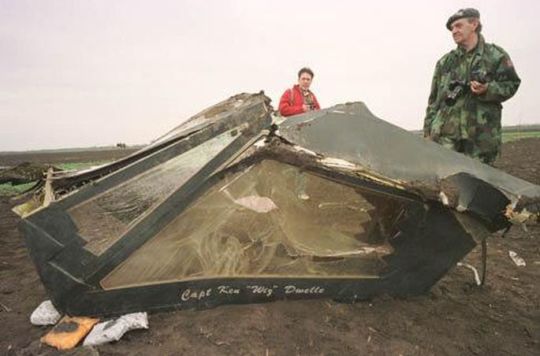
F-117 wreckage in Serbia.
The pilot successfully ejected and was rescued between 5 and 8 hours later (depending on the sources): AFSOC (Air Force Special Operations Command) dispatched MH-53M, MH-53J and MH-60 aircrew along with Special Tactics Airmen responded to the emergency and, coordinated by E-3 AWACS and supported by several specialized platforms, including an EC-130E ABCCC and A-10 in Sandy role, rescued the F-117 pilot.
youtube
While the shootdown of the F-117 #82-0806 marked the first ever and only downing of a stealth aircraft in combat, how the Serbians managed to achieve the then almost unbelievable kill is still open to debate.
On one side, the Serbs claimed they had found a way to detect stealth aircraft by using slightly modified radars: the modifications involved the use of long wavelengths to try to “paint” the target at short range, exploiting the moment when the low observability of the Nighthawk was degraded by the opening of the bomb bay door.
However, this was not true: according to some Serbian sources, the story of the modification was purposely told by the battalion commander and served as propaganda. In the end there was no modification of the P-18 or SNR-125 radar.
What is true is that the Serbians were extremely cautious in operating their SAM batteries, dispatching messages without using cell phones or radios, so as not to risk to be intercepted and geo-located, and relocating the batteries across the country.
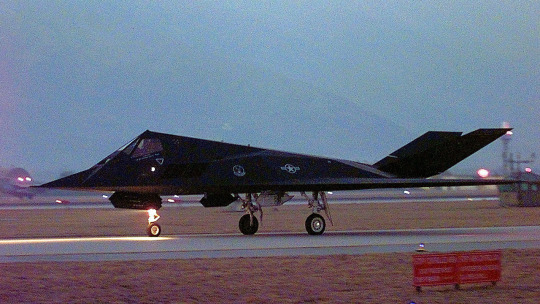
F-117 taxies at Aviano AB during Operation Allied Force (USAF)
In the end, besides the successful tactics used by the Serbians, the shootdown of the F-117 was also the result of a series of other contributing factors:
the use of the same route for the third day in a row, making the flight path of the stealth aircraft predictable
the lack of dedicated SEAD (Suppression of Enemy Air Defenses) support
the fact that the F-117 approached the Belgrade area flying at low level, jinking and banking
the Serbs knew that the F-117s were coming, because, they monitored U.S. and allied radio comms on UHF and VHF frequencies, which, at the time, were mostly unencrypted; were also able to intercept NATO plane’s ATO (Air Tasking Orders) that enabled them to put anti-aircraft batteries at positions close to the ground targets; relied on a network of spies who operated outside the Italian airbases spotting aircraft taking off and others, near the Serbian borders, who provided details about the incoming raids.
Anyway, the achievement of Colonel Dani Zoltan, who commanded the SAM battery of the 3rd Battalion and used a SAM system introduced in 1961, is impressive especially considering that, after shooting down “Vega 31”, “Hammer 34”, an F-16C of the 31st Fighter Wing piloted by Lt. Col. Dave Goldfein (future Chief of Staff of the United States Air Force) was also shot down by the 250th Air Defense Missile Brigade on May 2, 1999.
Moreover, it has also emerged that another F-117 was damaged by Serbian air defenses during Allied Force.
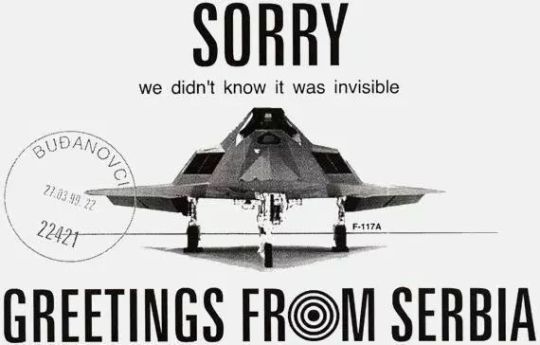
A Yugoslav propaganda poster, stating facetiously “Sorry we didn’t know it was invisible”.
The F-117 today
25 years after the famous and quite surprising, at that time, downing, the iconic F-117 continue to fly, despite being officially retired in 2008.
As we report quite frequently here at The Aviationist, F-117s are still flying not only for training purposes as adversary aircraft and cruise missile surrogate, but also for research, development, test and evaluation, possibly related to next generation programs.
In accordance with of the Nation Defense Authorization Act (NDAA) of 2007 (PL 109- 364, Section 136), 52 F-117 aircraft were retired and relocated to the Tonopah Test Range (TTR). Under the requirements of the NDAA, the USAF preserved each F-117 aircraft in Type-l000 (T-1000) storage, which maintains the aircraft in a condition that allows recall for future service. On 30 November 2016, Section 133 of Subtitle D of the National Defense Authorization Act repealed the requirement to preserve the F-117 aircraft in a recallable condition and the USAF intended to declassify, demilitarize, and disposition four F-117 aircraft per year.
F-117 Fresno
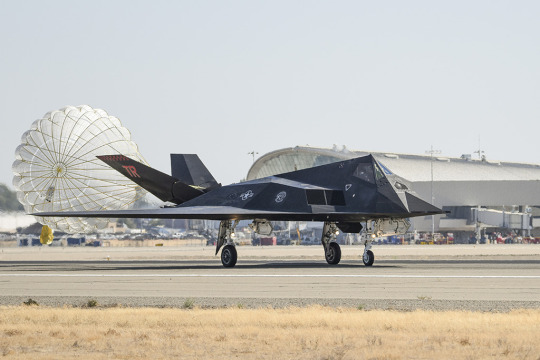
An F-117 Nighthawk lands for the first time at the Fresno Yosemite International Airport, Sept 13, 2021, to conduct training missions with the local Air National Guard unit. Two F-117 Nighthawks are participating in dissimilar air combat training missions this week along with F-15 pilots from the 144th Fighter Wing in Fresno, Calif. (Air National Guard photo by Capt. Jason Sanchez)
The aircraft continued to be spotted, even more than it had happened until then, with the Nighthawks also deploying to several U.S. bases to carry out Dissimilar Air Combat Training with other U.S. types. Then, in 2021, the U.S. Air Force published the first official images of the type still involved in flight operations on the DVIDS (Defense Visual Information Distribution Service) network.
In September 2022 the Air Force Test Center published a Request For Information (RFI) about a possible 10-year contract, expected to start from January 1, 2024, for maintenance and logistics support services for the F-117A fleet at the TTR airfield, acknowledging that the U.S. Air Force is willing to keep the aircraft flying at least until 2034. Interestingly, the U.S. Air Force is about to complete the certification of the F-117s to refuel from the KC-46: a sign that the service plans to keep the Nighthawk flying for many more years.
F-117
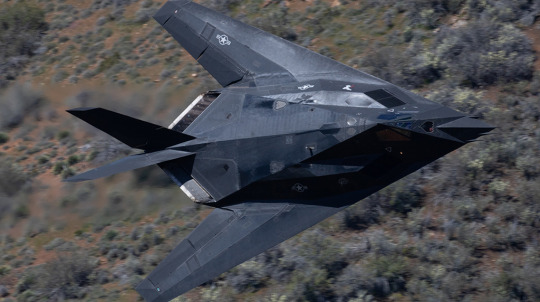
One of the two F-117s flying low over the Sierra Mountains on Apr. 21, 2023. (Image credit: @stinkjet)
About David Cenciotti
David Cenciotti is a journalist based in Rome, Italy. He is the Founder and Editor of “The Aviationist”, one of the world’s most famous and read military aviation blogs. Since 1996, he has written for major worldwide magazines, including Air Forces Monthly, Combat Aircraft, and many others, covering aviation, defense, war, industry, intelligence, crime and cyberwar. He has reported from the U.S., Europe, Australia and Syria, and flown several combat planes with different air forces. He is a former 2nd Lt. of the Italian Air Force, a private pilot and a graduate in Computer Engineering. He has written five books and contributed to many more ones.
@theAviationist via X
8 notes
·
View notes
Text
The Rise of GPS Tracking Platforms Melbourne

In an age where technological innovations continue to change daily life, GPS tracking has come up as a crucial innovation with different applications ranging from personal to complex business solutions. As of now GPS tracking platforms Melbourne has taken over the vibrant and technologically advanced city, showing a significant transformation around the city and service efficiency.
View of GPS Tracking
GPS (Global Positioning System) tracking includes observing and tracking the location of objects or people with signals from the satellite. These devices receive signals from a network of satellites to know about the exact locations, giving instant updates on their whereabouts. Such devices are used in different fields, including transportation, asset management, and personal safety.
Historical Adoption in Melbourne
Over the last ten years, the use of GPS tracking platforms Melbourne has notably increased. Initially used mainly for navigation, improvements in technology have broadened its applications to include delivery services, public transportation, personal safety, and fleet management.
Early Applications
Melbourne began using GPS technology in the late 1990s and early 2000s with the origin of GPS tracking devices for navigation. The car navigation systems became popular, assisting drivers with route optimization and avoiding traffic.
Integration into Business Solutions
As technology improved, businesses in Melbourne realized the potential of GPS-tracking companies to improve operational efficiency. The logistics and transportation sectors were early adopters, using GPS fleet tracking to optimize routes, reduce fuel consumption, and improve delivery services.
Public Transport Enhancement
The city's public transportation system now includes GPS tracking systems. The trains, trams, and buses have GPS devices fitted in them, offering travelers instant updates on the arrival and departure times. This integration has simplified travel, reduced wait times, and increased overall system dependability.
Applications of GPS Tracking Platforms in Melbourne
GPS tracking platforms Melbourne offers various purposes:
- Fleet Management: Some businesses with large fleets such as delivery services, taxi companies, and public transport operators, use GPS fleet tracking Australia to check on their vehicles, plan routes properly, and ensure driver safety.
- Asset Tracking: Industries such as construction and rental services use GPS devices to monitor valuable assets, prevent theft, and ensure accurate equipment utilization.
- Personal Safety: GPS tracking devices are being used by many for personal safety. They allow parents to monitor their children and enable caregivers to track elderly family members.
- Public Transport: Real-time updates from GPS improve public transport efficiency, encouraging more people to use eco-friendly traveling options.
- Emergency Services: GPS tracking helps emergency services dispatch units quickly to critical situations, potentially saving lives.
Benefits of GPS Tracking Platforms in Melbourne
The widespread use of GPS tracking platforms Melbourne is due to several key benefits:
- Enhanced Efficiency: Real-time tracking allows systematic resource distribution and optimized route planning, reducing functional costs.
- Cost Savings: Businesses benefit from lower fuel consumption, reduced maintenance expenses, and improved driver behavior with the use of GPS tracking devices.
- Instant Updates: Timely information enhances decision-making for businesses and improves commuting experiences for travelers.
- Theft Prevention: GPS tracking minimizes theft risks by enabling quick recovery of stolen things through accurate location tracking.
Challenges and Considerations
Despite some benefits, GPS tracking platforms Melbourne faces several challenges that require careful attention:
- Privacy Concerns: We must balance tracking benefits with individuals' privacy rights by having clear rules and getting permission.
- Data Security: Keeping GPS data safe from unauthorized entry and storing it securely is crucial.
- Technical Issues: Sometimes GPS signals may be lost, or devices may stop working, so it's important to have good support to fix problems quickly.
- Implementation Costs: Starting GPS tracking device can be expensive for small businesses, but the long-term advantages usually make it worthwhile.
The Future of GPS Tracking Platforms
The future of GPS tracking platforms Melbourne looks great due to the ongoing technological growth and better applications:
- Integration with IoT: Combining GPS with IoT (Internet of Things) technologies will increase data accuracy and performance across different industries.
- Autonomous Vehicles: The rise of self-driving vehicles will increase the requirement of GPS tracking systems to ensure safe and systematic navigation.
- Sustainability Initiatives: The GPS tracking company supports environmental sustainability by planning better routes, reducing fuel consumption, and promoting eco-friendly transportation.
- Customization and Innovation: Future GPS systems should offer industry-specific customization, easy connection with other technologies, and better reporting capabilities according to business needs.
In conclusion, the increasing popularity of GPS tracking platforms Melbourne shows the city's commitment to use advanced technology for benefits of society. While issues such as privacy and security must be tackled, the transforming ability of GPS technology in providing better efficiency, safety, and fleet tracking is undeniably great. As Melbourne continues to grow and adapt, it is set to lead in using GPS tracking technologies, improving both business and community.
2 notes
·
View notes
Link
An Uber clone taxi booking app solution is a software package that replicates the features and functionalities of the popular ride-hailing platform Uber.

10 notes
·
View notes
Text
Sticking with the theme of magical realism, I could see two fun responses to this problem.
One is a means of funding the taxis to make up for lost fares. Maybe the city devotes a portion of revenue to a fund which the drivers can request reimbursement from, and this of course leads to all kinds of bureaucratic headaches a la proving the lost fare was a ghost and people trying to defraud the system. Maybe the area just has to pay the can company enough to cover the fares, plus some extra amount because capitalism gotta gouge. This seems extra likely if it's an area that the society doesn't see as worth caring about, like the New Orleans example.
Alternatively, the second option is that areas dealing with ghost cab-riders start ensuring that their dead have cab fare, thus rediscovering the Obol. Maybe this leads to Charon trying his hand at being a cabbie, maybe Hades runs dispatch, maybe Zeus runs for the mayor of the town... Maybe since this is in New Orleans I just accidentally built a rework of Hadestown and only just realized it right here at the end. Maybe I really want to see this written now... dammit
I still think that my favorite urban legend/folklore fact is that there are certain areas in New Orleans where you cannot get a taxi late at night not because it isn’t safe, but because taxi companies have had recurring problems of picking up ghosts in those areas who are not aware that they are dead and disappearing from the cab before reaching the destination and therefore stiffing the driver on the fare causing a loss for the company.
512K notes
·
View notes
Text
How to Build an Uber-Like App: Your Ultimate Step-by-Step Guide?
With the rise of the on-demand economy, ride-sharing apps like Uber have become an integral part of urban transportation. If you’re interested in developing your own Uber-like app, whether to cater to a specific niche or to compete in the ride-sharing market, follow this detailed guide to make your project a success.
1. Craft Your Vision
1.1 Clarify Your Goals
Define the purpose of your app. Are you targeting daily commuters, luxury travelers, or a specialized market like healthcare transport?
Determine what makes your app unique compared to existing services.
1.2 Identify Your Audience
Conduct market research to understand the needs and preferences of your potential users.
Develop detailed user personas to guide the design and functionality of your app.
2. Conduct Comprehensive Market Research
2.1 Analyze Competitors
Examine leading ride-sharing apps like Uber and Lyft, as well as local competitors.
Note their strengths, weaknesses, and user feedback to understand industry standards and gaps.
2.2 Spot Industry Trends
Investigate current trends such as green transportation solutions, autonomous vehicles, and new business models.
Keep track of technological advancements that could influence the ride-sharing landscape.
3. Define Your App’s Features
3.1 Essential Features
User Profiles: Secure sign-up and login options, along with profile management capabilities.
Ride Booking System: Streamlined booking process, vehicle selection, and scheduling options.
GPS Tracking: Real-time location tracking for both drivers and passengers using reliable GPS technology.
Payment Processing: Integration with payment gateways like Stripe or PayPal for seamless transactions.
Driver Dashboard: Tools for drivers to manage ride requests, track earnings, and update their status.
Feedback System: Rating and review features for drivers and riders to ensure quality service.
3.2 Advanced Features
In-App Messaging: Secure communication between drivers and passengers.
Ride History: Users can view their past trips and receipts.
Fare Calculator: Estimate ride costs before confirming bookings.
Emergency Button: Safety feature for immediate assistance.
4. Select the Right Technology Stack
4.1 Frontend Development
Mobile Development: Decide between native apps for iOS and Android or cross-platform frameworks like React Native or Flutter for efficiency.
4.2 Backend Infrastructure
Server-Side Solutions: Opt for robust frameworks like Node.js, Ruby on Rails, or Django to handle app logic and data.
Database Options: Use databases such as MongoDB, PostgreSQL, or Firebase to manage user and ride information effectively.
4.3 API Integrations
Mapping Services: Integrate with Google Maps API or Mapbox for location services and navigation.
Payment Systems: Implement payment processors like Stripe, PayPal, or Braintree for secure transactions.
5. Design an Engaging UI/UX
5.1 Design Principles
Wireframes and Prototypes: Create initial wireframes and interactive prototypes to visualize the user flow and interface.
User-Centric Design: Focus on creating a simple, intuitive design that provides a seamless user experience on both iOS and Android devices.
5.2 Usability Testing
Conduct tests with real users to gather feedback on the design and make necessary adjustments to improve usability.
6. Develop Your App
6.1 Development Phases
Frontend Development: Build the app’s user interface, ensuring it’s responsive and visually appealing.
Backend Development: Develop the server-side components, including APIs and databases, to support app functionality.
6.2 Integration
Combine frontend and backend systems to ensure smooth operation. Test integrations with third-party services for maps and payment processing.
7. Thorough Testing
7.1 Types of Testing
Functionality Testing: Ensure all features operate correctly and as intended.
Performance Testing: Evaluate the app’s performance under various conditions, including high user traffic.
Security Testing: Implement rigorous security measures to protect user data and prevent breaches.
Usability Testing: Assess the app’s ease of use and overall user satisfaction.
7.2 Beta Testing
Release a beta version to a select group of users to identify and address potential issues before the full launch.
8. Launch and Promote
8.1 Launch Strategy
Plan a phased launch to manage initial user load and gather feedback.
Prepare for a full-scale launch with a well-crafted marketing strategy.
8.2 Marketing Techniques
Digital Campaigns: Leverage social media, search engine optimization (SEO), and paid advertising to increase visibility.
Local Outreach: Offer special promotions or discounts to attract users in your initial launch area.
Partnerships: Collaborate with local businesses or influencers to boost your app’s reach.
9. Post-Launch Support and Optimization
9.1 Monitor and Analyze
Use analytics tools to track app performance, user behavior, and engagement metrics.
Collect and analyze user feedback to identify areas for improvement.
9.2 Continuous Updates
Regularly update the app to fix bugs, enhance performance, and introduce new features.
Stay responsive to user feedback and adapt to emerging trends and market demands.
Conclusion
Creating an Uber-like app involves detailed planning, development, and ongoing refinement. By following this step-by-step guide, you can build a robust and competitive ride-sharing platform tailored to meet user needs and stand out in the market. For professional guidance and support in bringing your app to life, visit TaxiAppz.com and discover how we can help turn your vision into reality.
0 notes
Text
Enhance Your Business With Taxi Booking App Software In 2025
As urban mobility evolves, businesses investing in taxi booking app software get a competitive advantage in the marketplace.
Whether you're an entrepreneur starting a ride-hailing business or an experienced fleet operator trying to improve your services, selecting the right software solution is critical to success.
Explore this blog for extensive information that you won’t want to miss!.
Best 5 Taxi Booking App Software Solutions
Here, we explore the dominating software solutions in the ride-hailing industry.
Uber
One of the most popular software solutions is Uber. This is ideal for entrepreneurs looking to establish ride-hailing apps like Uber Clone.
Uber achieved an annual revenue of $43.9 billion in 2024, up 18% from the previous year. This software is completely customisable, and it is constantly evolving with AI-powered features and autonomous vehicle integrations.
iCabbi
iCabbi is a cloud-based taxi dispatch solution that reached a revenue of $15 million. This enables businesses to automate booking and optimize driver management.
Voice-enabled feature, which allows customers to book a taxi using smart assistants like Alexa and Google Assistant.
It is easily integrated with third-party payment gateways, provides various ride options, and supports smooth operations.
TaxiCaller
Taxicaller is a scalable and effective taxi booking software for fleet operations. The revenue reached $1.8 million in 2024. It provides web-based dispatching, driver and passenger apps, and detailed analytics.
The software is known for its ease of use and cost-effectiveness, making it an excellent alternative for small to medium-sized taxi companies.
CabStartUp
CabStartup is a white-label taxi dispatch system that offers a scalable platform for limo services, rideshare firms, and taxi companies. This reported revenue of approximately $589.4K in 2024.
It includes cloud-based dispatch, fare calculation automation, and multi-platform support for Android and iOS. The AI-powered feature predicts peak hours and distributes rides dynamically to reduce wait times.
RideCell
RideCell is an AI-based solution for optimizing car-sharing, ride-hailing, and fleet management. The annual revenue reached $35 million as of January 2025.
It helps businesses streamline automation, predictive analytics, and intelligent routing, making it a valuable tool for handling large-scale taxi operations.
Major Functions to Consider in Taxi Dispatch Software
When choosing the taxi dispatch software businesses should emphasize the following functions to maintain operational efficiency and customer satisfaction.
User-friendly booking system- An intuitive interface that allows passengers to book rides effortlessly.
Ride scheduling- Pre-booking features allow customers to schedule rides in advance, providing greater convenience and flexibility.
AI-driven route optimization- Enable drivers to identify the shortest and most effective routes, reducing fuel expenses and enhancing ride experiences.
GPS tracking- Both admins and passengers must be provided with real-time tracking to improve safety, navigation, and transparency.
Multiple payment gateways- Integrate software with multiple payment options like credit/ debit cards, wallets, cryptocurrency, and cash on delivery.
Rating system- This allows riders to provide feedback on their journey experience, which helps businesses improve service quality.
In-app communication- Secure chat and call functionalities between riders and drivers increase cooperation and the overall customer experience.
White-label customization- Businesses should use taxi booking app software that enables branding customization, ensuring a unique market identity.
End Note
In 2025, the taxi booking industry will rely primarily on advanced technologies. This blog highlighted five popular taxi-booking app solutions and their core functionalities to boost your transportation business.
By investing in reliable taxi dispatch software, you can improve business growth and deliver superior service to the customers.
Get started today!.

0 notes
Text
Getting Around Caroline Springs: The Local Taxi Service That Residents Trust

After seven frustrating months dealing with inconsistent rideshare waits in Caroline Springs, I switched back to our local taxi service and honestly wish I'd done it sooner. The coverage out here in the western suburbs has always been spotty with the big apps, especially during peak hours when suddenly prices triple.
My regular morning driver, Raj, knows exactly which entrance to use at the station during construction and keeps me updated on platform changes for the Sunbury line. When I mentioned my son's basketball games, he told me about the shortcut behind the recreation center that saves about six minutes during weekend tournament traffic.
The dispatch system isn't fancy – no sleek app interfaces – but it's remarkably efficient. Helen, who handles morning calls, has memorized regular customers' addresses and preferences. When I call for my weekly Thursday night pickup from book club, she already knows I prefer a quiet ride.
Their pricing structure makes actual sense. A trip to the airport is a flat $48, regardless of time of day, which makes budgeting for work trips straightforward. My neighbor Tom uses them for his dialysis appointments and mentioned that driver Kate always keeps the temperature comfortable for his return trips when he's feeling unwell.
The vehicles vary – mostly Toyota Camrys with a few newer hybrids – but they're consistently clean and well-maintained.
#Caroline Springs taxi#taxi Caroline Springs#Caroline Springs taxi service#book taxi Caroline Springs#taxi near Caroline Springs#Caroline Springs cab#Caroline Springs cabs#Caroline Springs airport taxi#maxi taxi Caroline Springs
0 notes
Text
7 Marketing Ideas To Skyrocket Your Taxi Business with Fleetera Taxi Booking
Ready to take your taxi business to new heights? Explore seven innovative marketing ideas tailored for success with Fleetera Taxi Booking Software. Elevate your brand and drive bookings today. Get started now! https://www.fleetera.io/blog/7-marketing-ideas-to-skyrocket-taxi-business-in-2023/
0 notes
Text
Intelligent Dispatch System for Taxi Fleets

With Logistifie’s dispatch system for taxi services, managing your fleet becomes efficient, smart, and seamless. This cloud-based solution offers real-time vehicle tracking, smart driver assignment, and automated dispatching to minimise delays and improve customer satisfaction. Dispatchers can monitor all operations from a central dashboard, while drivers stay updated with instant ride alerts and navigation support. Designed for scalability, this system adapts to fleets of all sizes and types, from minicabs to luxury vehicles. It helps streamline every ride, reduce operational errors, and boost performance—making it an essential tool for every forward-thinking taxi operator.
#dispatch system#online taxi dispatch system#cab dispatch system#transportation#software development#software#driverapp#logistics
0 notes